Showing 1081–1090 of 1165 results
Vedanta for the Western World is a collection of sixty-eight articles appeared in a magazine having the same title during 1938-45 by eminent scholars of international repute such as Aldous Huxley, Allan Hunter, Gerald Heard and Swami Prabhavananda reflecting on the varied aspects and universal reflections of Vedanta, with an Introduction by Christopher Isherwood. Vedanta, the Vedic philosophy per se, and not time-specific, focuses on three fundamental propositions that man’s real nature is divine; aim of human life is to realize this divine nature; and all religions are essentially in agreement as far as this divine concept is concerned. The essays featured in this volume imbibe and exude the same philosophy being best suited to the understanding of new generation audience, especially the one that belongs to the Western world. This unique volume stands out in its genera of works due to a wide gamut of topics featured in it under the umbrella banner Vedanta. It enables every student of Vedanta know the essence of the Vedic philosophies from the perspectives of both Indian and Western scholars and men of merit.

The multidimensional approach to Vedānta Science Technology extends the core scientific ideas of Vedānta to social, cultural, aesthetic and religious principles. The effort is to present a wide spectrum of intellectual discourse trying to discover fundamental scientific and technological aspects of Vedānta studies.
Vedānta texts have been well known for their richness in fundamental scientific and technological principles with strong potential for research and development today. In fact, much of ancient India’s remarkable achievements in science and technology can be credited to Vedantic texts.
This volume – proceedings of the 22nd International Congress of Vedanta held during 27-30 December 2015 at Jawaharlal Nehru University, New Delhi – features 53 scholarly articles from a wide variety of areas of study. The 22nd Vedanta was a confluence of scholars from various disciplines and the papers in this volume bear the imprint of an intense discussion that is usually expected from a good Vedanta seminar. Though the majority of the papers are in English, a few are in Sanskrit and Hindi as well. The papers are grouped under Vedānta Studies, Vedānta and Philosophy, Vedānta and Science, Vedānta and Culture, Applied Vedānta, and Digital Access and Search of Sanskrit Texts.
This multidimensional approach extends the core scientific ideas of Vedānta to social, cultural, aesthetic and religious aspects of studies, creating a wide spectrum of intellectual discourse and trying to discover fundamental scientific and technological aspects of Vedānta studies.
Being a worthwhile addition to Vedānta studies, this volume should invoke keen interest among all those who are deeply into it, be a student, a researcher or a common reader.
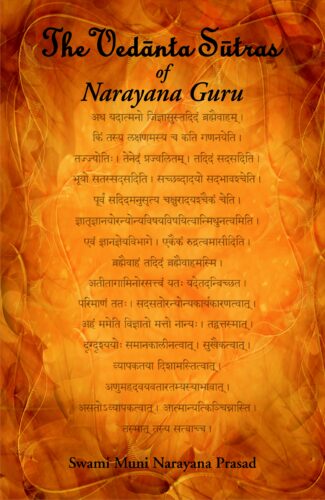
The Vedanta Sutras of philosopher-poet Narayana Guru has 24 beautifully-fluent sutras revealing the essential message of the Vedanta. The highly-perceptive commentary by Swami Narayana Prasad elucidates the gurus interpretation of the Vedantic concept.
Indias wisdom, one may say, attained its maturity in the Vedanta the end or culmination of veda (knowledge). Vedanta may be seen as the finest fruit on the tree of Indias wisdom, for it brings the seeker that ultimate knowledge that ushers in the gift of self-fulfilment (ananda). Over the centuries, brilliant saint-scholars like Shankara, Ramanuja, Madhva have interpreted the Vedanta in different ways. The philosopher-poet Narayana Guru belongs to this class of noted exponents of the Vedanta. And his Vedanta Sutras is a masterpiece in his attempt to restate the original Upanishadic teaching of non-dual Reality his most succinct expression of that message. This book presents these sutras along with a highly-perceptive commentary that elucidates the Gurus interpretation of the Vedantic concept in a brilliant style. Narayana Gurus Vedanta Sutras reveal the essential message of the Vedanta in 24 beautifully-fluent sutras. His simple and direct revaluation and restatement of the Vedanta, in general, has been found to be comprehensive and contemplative in its insight, reconciling the superficial disagreements of the Vedantic schools and restoring the pristine vision of the Upanishadic sages. In this scientific age, his work has often been acclaimed for its relevance. His Vedanta Sutras, compact yet profound in manner, is yet another example of this. The thoroughly-engrossing commentary of Swami Muni Narayana Prasad is a unique effort. Its hallmark is his clear avoidance of exegesis with greater reliance on his personal conviction. Swami Muni Narayana Prasad places Narayana Guru on par with the sutrakaras like Badarayana, Jaimini, Gautama and Kanada with this beautiful elucidation.
Sree Narayana Guru (1856–1928), an enlightened seer, represents Vedanta as a Science of Consciousness or pure Epistemology. This book deals with Guru’s epistemology and shows how it can eliminate many of the problems in philosophy and life.
The Guru conceives Consciousness or Arivu as the one all underlying Reality that assumes the form of everything in the world, both mind and matter.
Epistemologists are usually either idealists or realists, but the Guru is neither. To him there is no need to place one above the other since they are two manifest forms of one Consciousness.
Many eminent persons have tried to solve the problem of consciousness, but could not succeed because they were not ready to consider man as a pure being and the essence of the world as Consciousness.
To the Guru, in every event of knowing there is the coming together of subject, object and also the function of knowing. These three are Consciousness in essence. What we really need is awareness of it. All kinds of divisiveness, conflicts and crises can be solved through an awakening of the inner consciousness of man which is non-different from the one all underlying Reality titled Brahman, Atman or Consciousness.
This volume explains the mysteries of Creation from the Vedic standpoint by an eminent scholar Pandit Motilal Shastri, a devout disciple of the much acclaimed Vedic guru, Paṇḍit Madhusūdan Ojhā. It consists of five scholarly discourses presented before an august audience of well-known scholars and ācāryas of Vedaśāstra, at Rashtrapati Bhawan during 14-18 December 1956. These discourses – Science of Agni-soma; the Science of Five Divisional Universe; Vedic Concept of Man: An Exposition; Science of Aśvattha: An Outline; and Integrated Relationship of Vedaśāstra and Purāṇaśāstra – illuminate new insights into the mysteries of Creation, offering new definitions to well-known Vedic terms. The volume in hand is an English translation of these five discourses by Rishi Kumar Mishra, a well-known author, writer and editor, and a disciple of Pandit Motilal Shastri. It enables the new generation of scholars and intellectuals to understand and grasp the mysteries of Creation. It is an inimitable storehouse of Vedic wisdom.
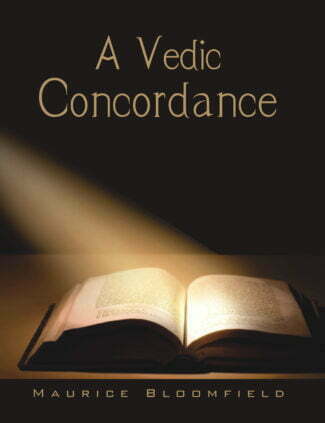
This volume, originally published in 1906 as part of the Harvard Oriental Series, is an alphabetic index to every line of every stanza of the published Vedic literature and to the liturgical formulas; it is an index to the Vedic mantras, together with an account of their variations in the different Vedic books.
This volume, A Vedic Concordance, is part of the Harvard Oriental Series. This reprint of the 1906 edition is an alphabetic index to every line of every stanza of the published Vedic literature and to the liturgical formulas; it is an index to the Vedic mantras, together with an account of their variations in the different Vedic books.
This volume is expected to serve two purposes. 1. It gives a comprehensive index of all the mantras. 2. It registers the variants of mantras that are not wholly identical. In addition, it spells out few secondary uses. (i) It is a key to the liturgical employment of the mantras. (ii) It is virtually a finding-index of rites and practices. (iii) It is a tool for future editors of Vedic texts. (iv) It is a repertory of the most archaic Hindu prose. (v) It also provides some miscellaneous uses to the future researchers in the domain of Vedic studies and sciences.
A must buy for all universities, colleges, institutions, scholars, researchers, and students who are engaged in Vedic studies.
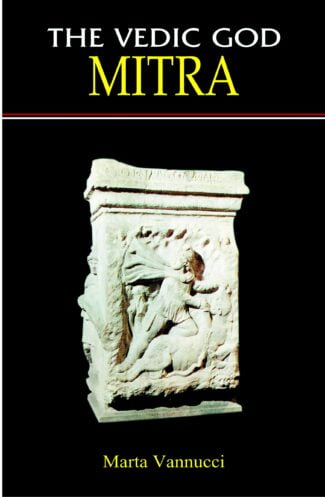
The book talks about the origin, personality and evolution of the Vedic God Mitra, and refers to the Rigveda and emergence of new gods as facets of the original Mitra-Mithra with time. It also delves into religious and cultural aspects of life associated with Him.
The Vedic God Mitra was highly revered and invoked for proper fulfilment of civil and religious acts and duties. Mentioned 175 times in the Rigveda alone, He has been described as one of the most wonderful, glorious and mighty of the Vedic gods.
This work presents a synthetic study of the evolution of the personality of Mitra, a most significant representative of the early stages of the ancient Indo-Aryan and Indo-Iranian cultures. Beginning with a discussion on the name and personality of the Vedic God, Mitra, the work deals with the evolution of the god by referring to the Rigveda and emergence of new gods as facets of the original Mitra-Mithra with time. It examines how the personality of Mitra evolved in tune with ecological and cultural diversification, growing complexity and increase in knowledge of the various groups of people who worshipped Mitra/Mithra. It delves into religious and cultural aspects of life associated with Him. It is a detailed study of the concept and origin of the Indo-Iranian God Mithra and the relationship of the god with others in the Avestan scheme of divinity.
The volume, with explanations of various terms and concepts and supported by illustrations, will be useful to scholars and students of Indology — in particular, ancient religion and culture in India.
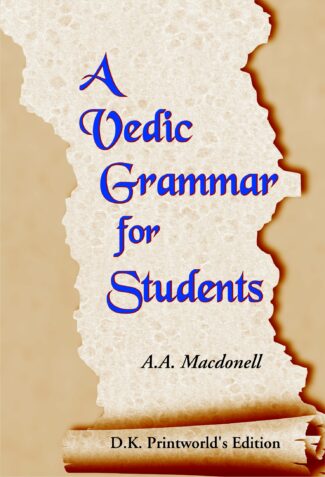
This book, typed afresh, presents a phonetic survey of Vedic sounds, offering explanatory accounts of Vedic sandhi-system, declension, conjugation, indeclinable words, nominal stem formation and syntax. It is the first ever most authentic, linguistic material of the Rgveda.
Here is a key to unlock the oldest treasury of mankinds wisdom: Vedic literature not just the metrical language of its hymns, but also the prose pieces of the Brahmanas/Brah-mana-like writings: whether from the Atharva or the Yujurveda. Setting forth a comprehensive phonetic survey of Vedic sounds, the author: an eminent Orientalist of yester years, offers lucid explanatory accounts of Vedic sandhi-system (euphonic combination), declension, conjugation, indeclinable words, nominal stem formation and, finally, of its syntax with numerous illustrations. At the base of Macdonells Grammar is the first ever, yet the most authentic, linguistic material of the Rigveda supplemented, though, it is from other Samhitas as well. Also marked here are the grammatical forms of the Brahmanas where they differ from those of the later-day classical Sanskrit. Now reprinted afresh in an innovative format, this book has sustained its decades-long worldwide importance as an undisputed, systematically organised aid to the study of Vedic literature. And, for sure, retains its indispensablity to scholars even today!

This book, typed afresh, presents a phonetic survey of Vedic sounds, offering explanatory accounts of Vedic sandhi-system, declension, conjugation, indeclinable words, nominal stem formation and syntax. It is the first ever most authentic, linguistic material of the Rgveda.
Here is a key to unlock the oldest treasury of mankinds wisdom: Vedic literature not just the metrical language of its hymns, but also the prose pieces of the Brahmanas/Brah-mana-like writings: whether from the Atharva or the Yujurveda. Setting forth a comprehensive phonetic survey of Vedic sounds, the author: an eminent Orientalist of yester years, offers lucid explanatory accounts of Vedic sandhi-system (euphonic combination), declension, conjugation, indeclinable words, nominal stem formation and, finally, of its syntax with numerous illustrations. At the base of Macdonells Grammar is the first ever, yet the most authentic, linguistic material of the Rigveda supplemented, though, it is from other Samhitas as well. Also marked here are the grammatical forms of the Brahmanas where they differ from those of the later-day classical Sanskrit. Now reprinted afresh in an innovative format, this book has sustained its decades-long worldwide importance as an undisputed, systematically organised aid to the study of Vedic literature. And, for sure, retains its indispensablity to scholars even today!
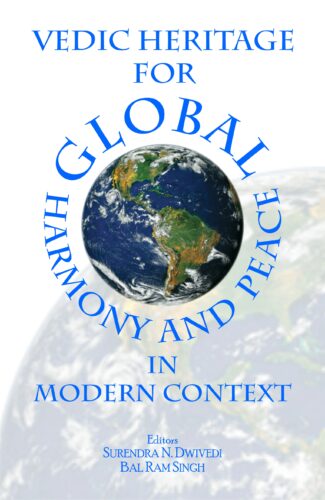
This volume delves into the different aspects of Vedic tradition, having global harmony and peace as the focus. It suggests one how to co-exist in the Upaniùads, how to practise Hindu universalism and the impact of âyurveda and the Bhagavad-Gita on our mental health, and the syncretism in ancient education.
The collection of scholarly articles presented in the volume explores various aspects of Vedic traditions, especially relating to global harmony and peace, in the present-day context. The Proceedings of the Sixth World Association for Vedic Studies (WAVES) Conference emphasise Vedic traditions as not confined to the Indian subcontinent today but as having spread to different parts of the globe. They deal with the essence of Vedanta, the contribution of the epic literature, history relating to the Rigvedic Aryans, Vedic sciences, and socio-economic and political aspects of Vedic life. Offering fresh ideas, they highlight the significance of the Vedic system for ensuring global peace and harmony, and satisfaction in the present. They study the concept of harmony and peace, and emphasise on the co-existence in the Upanishads, the Hindu concept of universalism, the importance of the Ayurveda and the Bhagavad-Gita in maintaining mental health, and on the global unity and syncretism in the education provided in ancient India. Attempts are made to cull out management ideas from the Mahabharata, and throw light on the relevance of the Arthashastra in modern-day geo-politics and the special relevance of Sanatana Dharma in the modern world. In the process, the scholars reveal the fictional aspects that have been linked to the Indian traditions and the related social evils.
The volume will interest a range of scholars of Indology and general readers as it explores the ancient Indian tradition, especially the Vedic tradition, in a comprehensive manner.
| There are no products |